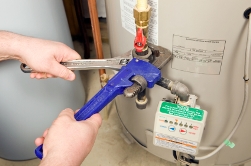What to Ask Plumber Training Schools

When you have decided to earn a diploma, certificate or degree, you can start to focus your school options. Since there are so many plumbing tech and trade schools in the Kansas City MO area, it's essential to have a checklist of criteria that each school must meet. The first 2 that we talked about were location and tuition expense. And even though both qualifiers may be critical when making your determination, there are additional variables that must be considered also. Below is a checklist of those added qualifiers that you will need to research before choosing a plumber trade school.
Is the Plumbing School Accredited? Numerous plumbing technical schools have attained either a regional or a national accreditation. They may attain Institutional Accreditation, which involves the school's programs as a whole, or Programmatic Accreditation, which relates to a specific program, for instance electrical technology. Confirm that the Kansas City MO school is accredited by a U.S. Department of Education recognized accrediting agency, for instance the Accreditation Board for Engineering and Technology. In addition to helping guarantee that you receive a superior education, it can assist in acquiring financial assistance or student loans, which are in many cases not available for non-accredited programs. Additionally, a number of states require that the plumbing training course be accredited in order to be approved for certification or licensing.
Is the Plumbing School Licensed? In addition to accreditation, an additional way of confirming that a trade school you’re considering is reputable is by checking that it’s properly licensed. Licensing is typically regulated and controlled by state agencies, such as the Missouri Department of Education. If you don’t know, ask the school which state agency is responsible for its licensing and then verify that it’s up to date.
How Long has the School been in Business? Another means of determining the quality of a technical school is to find out how long it’s been in business. The longer a school has been in operation, the more likely that its programs are highly rated and regarded. Conversely, schools that are not well regarded or that provide low quality training generally don’t stand the test of time. However, keep in mind that even the best of Kansas City MO schools had to start from their first day of operation, so only use it as one of several qualifications for each school you are considering.
What are the School’s Completion and Placement Rates? Ask the plumbing training programs you are looking at what their completion rates are. The completion rate is the portion or percentage of students who enroll in and finish the course. A low completion rate might signify that students were unhappy with the program and quit. It might also mean that the instructors were not competent to instruct the students. It's similarly important that the schools have high job placement rates. Older and/or more reputable schools may have a more extensive directory of alumni, which can result in more contacts for the school to employ for their apprenticeship and job placement programs. A high job placement rate will not only confirm that the school has a good reputation within the trade, but also that it has the network of contacts to help grads obtain apprenticeships or jobs in the Kansas City MO area.
Are Apprenticeship Programs Sponsored? Numerous plumber technical programs are taught in conjunction with an apprenticeship or an internship program. Those participating trade and technical programs will help place you in an apprenticeship program inside their network of plumbing companies or trade unions. Check if the schools you are reviewing have referring partnerships with local Kansas City MO plumbers or plumbing professionals. An apprenticeship not only offers a valuable experience by providing practical training, but it also supplies employment opportunities and helps to establish relationships in the local plumbing professional community.
Are there Modern Facilities? Make certain that the school facilities and the tools that you will be instructed on are state-of-the-art and what you will be working with on the job. If you are currently in an internship or an apprenticeship, talk to the master plumber you are working with concerning what you should be expecting. If not, ask a local Kansas City MO plumbing contracting company if they can provide some tips.
Where is the School Located? Unless you can move, the school must be within commuting distance of your Kansas City MO home. Take note that if you decide to enroll in an out-of-state school, in addition to moving costs there might be increased tuition charges compared to in-state residents.
Are there Smaller Classes? It's important that you get as much personalized instruction as possible, which can be challenging in bigger classes. Ask if you can monitor a few of the classes so that you can see how big they are and witness first hand the interaction between instructors and students. Talk to a few of the students and get their comments regarding class sizes and instruction. Finally, talk with some of the instructors and learn what their level of experience is in Kansas City MO and what degrees or certifications they have earned.
Is the Class Schedule Convenient? Make sure that the class schedules for the programs you are assessing are flexible enough to fulfill your needs. If you can only attend classes at night or on weekends near Kansas City MO, confirm that the schools you are comparing offer those choices. If you can only attend part-time, make sure that the school you select permits part-time enrollment. Additionally, find out what the protocol is to make-up classes should you miss any because of work, illness or family issues.
